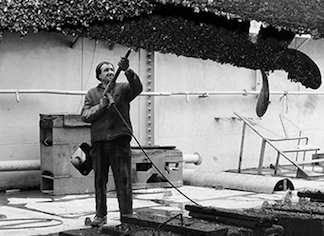The following is text of a news release from the International Maritime Organization (IMO):
(LONDON) — A groundbreaking Global Industry Alliance (GIA) has been launched to tackle two of the most pressing environmental issues of our time – invasive species and greenhouse gas (GHG) emissions. The GIA brings together stakeholders in the private sector and the GloFouling Partnerships, a project led by United Nations entities to address the transfer of harmful aquatic species through biofouling.
The new GIA will accelerate the development of solutions to improve the management of marine biofouling, which is the buildup of aquatic organisms on ships’ hulls or submerged structures such as platforms and aquaculture installations. Biofouling can lead to the introduction of potentially invasive species to new environments, where they may threaten native species and cause irreversible damage to biodiversity. It also has measurable impacts on a number of economic sectors such as fisheries, aquaculture and ocean energy. Once established in a new ecosystem, invasive species are extremely difficult – if not impossible – to eradicate.
The new Global Industry Alliance (GIA) for Marine Biosafety brings together private sector companies from various industries affected by biofouling, including shipping, aquaculture, offshore oil and gas and ocean renewable energies. These maritime champions will work together with the GloFouling Partnerships Project, a joint initiative between the Global Environment Facility (GEF), the United Nations Development Program (UNDP) and the International Maritime Organization (IMO). The key aims of the GIA are to leverage human, technological and financial resources; facilitate industry input into policy developments and a positive pull for reform processes; and the development and dissemination of technological solutions to improve biofouling management.
The work of the GIA will also contribute to a significant reduction in greenhouse gas emissions. Biofouling increases the drag of ships, forcing them to burn more fuel to maintain speed. The new global alliance is expected to promote solutions to improve the hydrodynamic performance of ships and thereby contribute to a significant reduction of the carbon footprint of the shipping industry.
The GIA was officially inaugurated on June 8 during an online meeting attended by representatives of the founding industry members as well as IMO and UNDP.
IMO Secretary-General Kitack Lim said the new alliance will, for the first time, bring together all maritime industries in finding solutions to two key environmental issues affecting our planet – protecting marine biodiversity and reducing greenhouse gas emissions.
“Under this new initiative, these industry champions, from different sectors, are coming together to address common challenges and move toward a more sustainable use of ocean resources," Lim said.
"At UNDP we are very pleased to witness the creation of a new GIA that can help us all to work together to remove key barriers, whether they be informational or technical, to transform maritime industries and channel their contribution toward achieving the targets of the Sustainable Development Goals and the reduction of greenhouse gas emissions from shipping,” said Andrew Hudson, head of UNDP’s Water & Ocean Governance Program.
Four companies have become the founding members of the Global Industry Alliance for Marine Biosafety: CleanSubSea, ECOsubsea, HullWiper and Sonihull. It is expected that more companies will join the GIA.
“This alliance is about the collective pioneering efforts by all maritime industries in undertaking the fight against invasive species and all the creativity and innovations that are being brought to the table to develop technological solutions," said Jose Matheickal, head of IMO’s Department for Partnerships and Projects. "Forging such an alliance among the current four founding partners lays the foundations of a potentially very large global partnership among maritime industry players.”
The GIA is open to new members. Interested companies can contact glofouling@imo.org.

